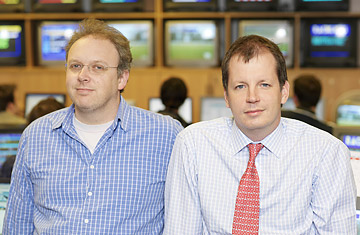
Co-founders of Betfair Andrew Black, left, and Edward Wray
(2 of 2)
Black: We did a lot of guerilla marketing that cost us next to nothing, just to try and catch the attention of anybody. We did lots of jokey sort of stuff: Ed and I were posing for pictures with bookmakers in coffins which is arguably a little distasteful but, you know, you had to do that sort of thing if you wanted to catch the attention of the papers. And all of this because we didn't have any money to spend. So a typical company, launching in the dotcom world at that time, would have had a huge marketing budget if they were serious. We didn't have that, so we had to make what we had work extra hard for us, but we did get few people's attention.
Wray: Looking back now, one of the best things that happened to us was that we didn't raise lots of money. Because dotcom companies were throwing money around right, left and center and because we couldn't afford to do that we thought very hard about what we applied our money to. For example, that picture with the two of us and a bookie pretending to be in a coffin, which was very tongue-in-cheek, was the front page of the Sunday Times business section three days before we launched.
Black: The stuff that's given me the most stress is probably not the kind of stuff you might expect. The concerns have always been "can this company rise to the occasion here?," because here we were, in my eyes, a bunch of earnest amateurs, who were getting stuck in but we were just this tiny little company, a bunch of guys without any dotcom heritage who didn't really know what they were doing but were feeling their way around, and we knew we had to turn ourselves into something much bigger, much more solid, much more dependable, reliable, and a big functional, corporate entity.
Wray: If I'd have known nine years ago that we'd be 1,200 people today, I wouldn't have ever even come close to starting the business because I would have been terrified of going from 2 to 1,200, and I just wouldn't have been able to work out how to do it. But of course, at the time, we weren't planning to get to 1,200, we were planning to go from 22, to 30, to 35, or whatever.
We're one of the very, very few Internet betting companies that have never taken a bet out of the U.S., and that's because our view has always been it is illegal, which it clearly is now, and so long as it's illegal, we're not going to do it. That's a long-term strategy. Clearly some people made good money out of taking bets out of the U.S. in the short term, [and] have now found themselves in trouble with the authorities. Gambling should be regulated, we're very comfortable with that. There are things that need to be safeguarded — how you look after vulnerable people, how you make sure it's a clean, above board business, etc. — you don't achieve that by prohibiting business. You achieve it by regulating it. The U.S. has tried prohibition once before and it wasn't a roaring success. And I think they'll find the same thing here. I don't know how long it will take, but I'm more confident than ever that the U.S. market will open up, and when it does, we will be right at the hub of it. It's frustrating to us that people in the U.S. can't access Betfair. But we go out of our way to make sure they can't because the law is the law and we will always respect that.
You've got to make sure the business you choose is something you have a passion for. This has to be a natural decision. The only other thing I would say, is you have to have a lot of luck. You should never dismiss luck, but when you get a stroke of luck, you consolidate it.